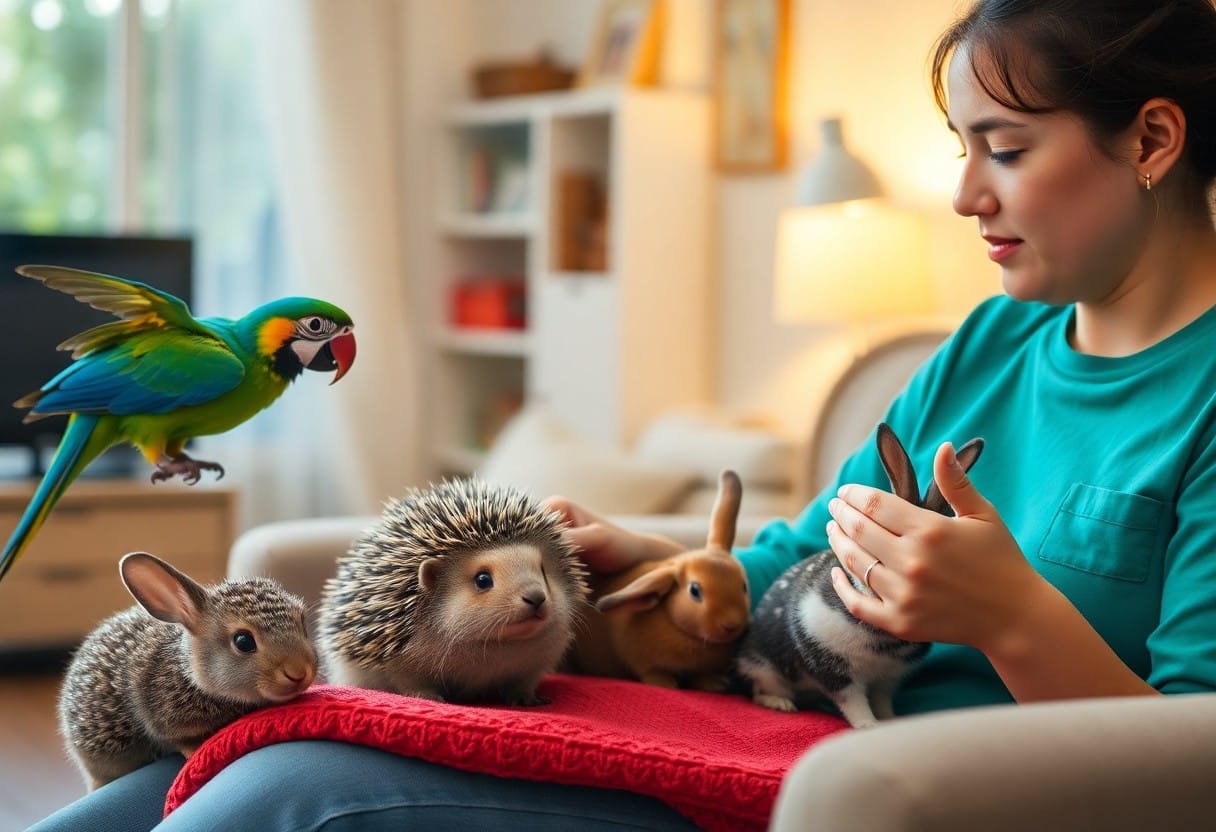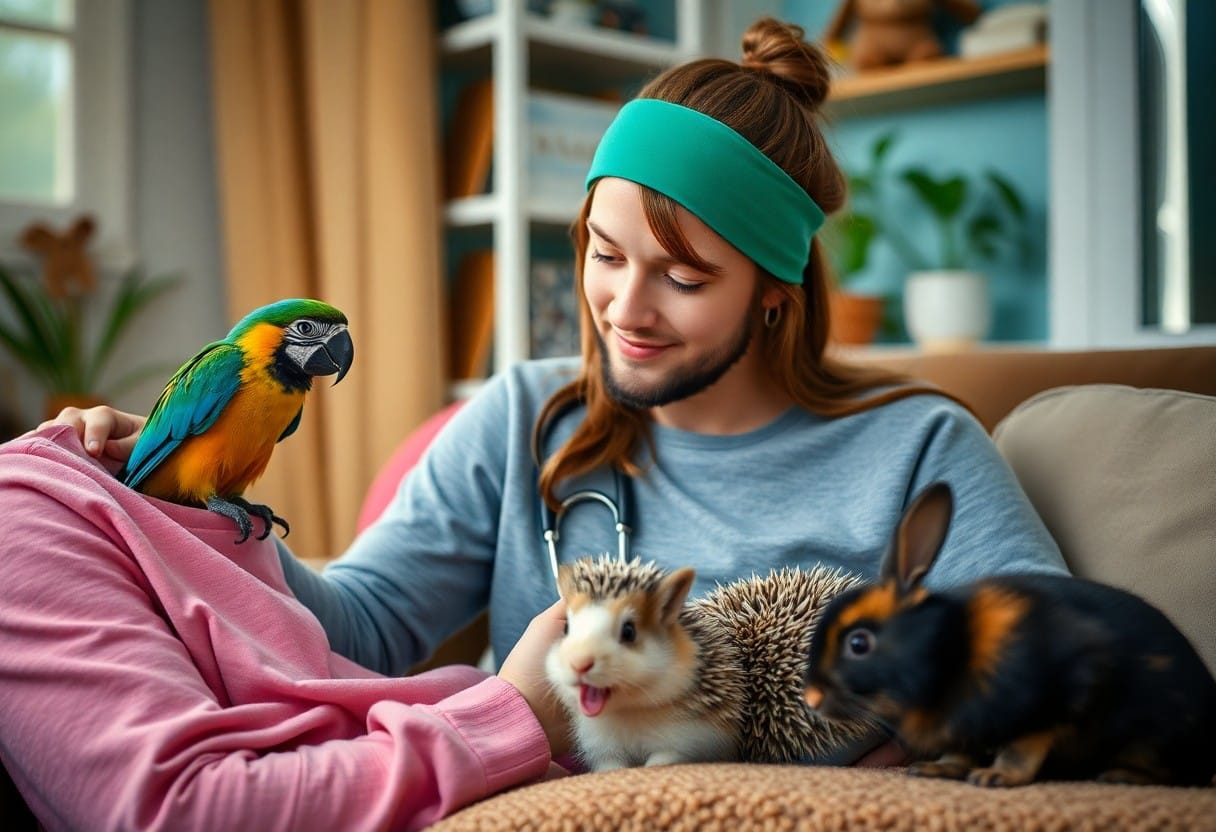You want to ensure your unique pet is cared for by someone who understands their specific needs. Finding the right pet sitter can make a significant difference in your pet’s happiness and well-being while you’re away. Start by assessing potential sitters’ experience with your particular animal type, whether it’s exotic, senior, or with special requirements. Additionally, it’s wise to conduct interviews and request references to gauge suitability. For more guidance, check out this resource on How to Find & Choose a Pet Sitter.

Key Takeaways:
- Assess the pet sitter’s experience with your specific type of animal to ensure they are knowledgeable and comfortable handling unique pets.
- Conduct interviews and ask for references to gauge the sitter’s reliability and ability to cater to your pet’s specific needs.
- Consider arranging a meet-and-greet between the pet sitter and your animal to observe their interactions and ensure a good fit.
Identifying Your Unique Pet’s Needs
Understanding your unique pet’s needs is the foundation of finding the right sitter. Each animal possesses distinct characteristics, temperaments, and requirements that must be catered to. Taking the time to identify what makes your pet special not only ensures their comfort but also makes your choice of pet sitter more informed. Keep in mind that the right sitter will not only respect your pet’s individual needs but also embrace their quirks, making for a harmonious relationship while you are away.
Understanding Behavioral Traits
Your pet’s behavioral traits play a significant role in how they interact with the world and can greatly affect their care. For instance, a shy cat may require a quiet environment and a sitter who understands the art of patience, while a high-energy dog thrives on active play and socialization. Knowing these traits helps you find a sitter who can provide a nurturing environment, meeting your pet’s emotional and social needs.
Assessing Medical and Dietary Requirements
Assessing your pet’s medical and dietary requirements is vital to ensure their well-being during your absence. If your pet takes medication or has specific health conditions, the sitter should be well-versed in administering those treatments. Similarly, feeding schedules and dietary restrictions must be clearly outlined. Providing this information not only eases your mind but also helps the sitter provide the best possible care for your furry friend.
For instance, if your dog requires a special diet due to allergies, sharing the details about acceptable foods and feeding times is necessary. Consider creating a written plan that outlines not only the types of food your pet can and cannot eat but also any signs to watch for that might indicate an adverse reaction. In the case of a pet with chronic conditions, like diabetes, ensure the sitter knows how to manage insulin injections or dietary adjustments. Equipping your sitter with all necessary medical and dietary information minimizes the risks of potential issues and promotes a stress-free experience for both your pet and their caregiver.
The Essential Qualities of a Great Pet Sitter
Finding a great pet sitter is about ensuring they have the right mix of qualities that cater to your unique animal’s needs. Look for someone who exhibits empathy, reliability, and excellent communication skills. A strong pet sitter should not only understand your pet’s behavioral quirks but also be able to handle emergencies with competence. Engaging someone who is adaptable and has a genuine love for animals ensures your pet stays happy and healthy while you’re away.
Experience with Specialty Animals
Seek out a pet sitter with specialized experience in caring for your type of animal. Whether you own reptiles, exotic birds, or miniature pigs, having someone who understands the specific dietary and environmental needs of these pets is non-negotiable. Their familiarity with potential health issues or behavioral tendencies characteristic of your unique pet will provide you with peace of mind.
Training and Certifications that Matter
Certifications can signal a pet sitter’s commitment to professionalism and excellence in animal care. Look for candidates with training in first-aid and CPR specifically for pets. Credentials from organizations like the National Association of Professional Pet Sitters (NAPPS) or Pet Sitters International (PSI) are indicators of quality. This foundation allows pet sitters to handle emergencies effectively and provide a safe environment for your beloved companion.
A strong educational background supports a pet sitter’s ability to care for unique animals. Certifications in animal behavior, grooming, and nutrition showcase their dedication to understanding your pet’s specific needs. For instance, a sitter trained in exotic animal care will know the right habitat conditions for reptiles, which can dramatically affect their well-being. Choosing a sitter with relevant credentials not only protects your pet but also ensures that they are in capable hands that prioritize their health and happiness.
Sourcing Potential Pet Sitters
Sourcing the right pet sitter begins with identifying candidates who have experience with your unique animal. Utilize various methods, both online and locally, to find the perfect fit. This involves checking their backgrounds, certifications, and references to ensure they can provide the care your pet requires.
Leveraging Online Platforms and Local Communities
Online platforms such as Rover and Care.com allow you to post specific needs and review profiles of potential pet sitters in your area. Join local social media groups focused on pets, where recommendations often flow freely from fellow pet owners who share similar experiences and challenges with their unique animals.
Networking with Fellow Pet Owners and Veterinarians
Engaging with other pet owners and veterinarians can significantly widen your pool of potential pet sitters. Your local veterinarian likely knows trusted professionals who have experience with unique animals. Additionally, connecting with fellow pet owners at parks or community gatherings allows you to tap into their experiences and recommendations.
Building relationships with fellow pet owners can provide valuable insight into who they trust for pet sitting services. You might learn about specialized pet sitters who cater to reptiles, birds, or other unique species—information often lost in generic search results. Additionally, veterinarians can recommend reliable sitters who are familiar with any health concerns your pet may have, ensuring your animal receives the best care possible while you’re away.
Conducting Effective Interviews and Assessments
Interviews and assessments provide a platform to gauge potential pet sitters’ suitability for your unique animal. Prioritize finding sitters who demonstrate knowledge, empathy, and a genuine love for animals. During this process, observe their demeanor and interaction with your pet, as it can reveal their comfort level and approach. Use this time to establish trust and ensure that the sitter aligns with your pet’s individual needs.
Key Questions to Ask During the Interview
Formulating specific questions will help you uncover a candidate’s experience and expertise. Inquire about their prior experience with your unique pet species, how they handle emergencies, and their familiarity with your pet’s specific needs. Questions like, “How would you manage my pet’s behavioral quirks?” or “Can you provide an example of a challenging situation you faced with a past pet?” can further highlight their problem-solving skills and adaptability.
Practical Tests and Trial Runs to Consider
Implementing practical tests can offer valuable insights into a sitter’s abilities. Consider scheduling a trial run for a few hours or an overnight stay to observe interactions in real-time, ensuring they can handle routine tasks and emergencies. This ‘test phase’ serves not only to see how well your pet responds to the sitter but also provides an opportunity for both you and your pet to assess the fit.
Practical tests and trial runs can be enhanced by introducing specific scenarios that mimic potential issues, such as loud noises or unexpected visitors. During the trial, you might note how the sitter maintains your pet’s routine, monitors their behavior, and reacts under pressure. For example, if your pet is known to be skittish during thunderstorms, observing how the sitter comforts them can be telling of their overall capabilities. Tailoring these assessments to match your pet’s unique challenges will help ensure a smooth and successful match.
Building Trust and Communication
Trust and communication are the cornerstones of a successful relationship with your pet sitter. Make sure you connect with your sitter prior to the actual sitting period to discuss your unique pet’s needs. Resources like Finding a Good Sitter for Your Animal Companion can provide invaluable guidance. Establishing a rapport allows your sitter to feel confident while caring for your pet. Regular check-ins during the sitting period will also help reinforce your comfort and ensure that your pet is safe and happy.
Establishing Clear Guidelines and Expectations
Clearly outline your pet’s daily schedule, routine, and special needs in advance. Include feeding times, preferred toys, and any specific behavioral quirks that require attention. This level of detail not only helps the sitter understand your pet better but also reduces potential stress for both parties. A well-defined list of dos and don’ts fosters an environment of confidence for your sitter and affirms the care quality your pet will receive.
Maintaining Ongoing Communication throughout the Sitting
Set a schedule for regular updates from your sitter, including texts or photos that document your pet’s well-being. This ongoing dialogue reassures you that your pet is being cared for as promised. Utilize apps with shared notes or checklists to facilitate this communication and keep everything organized.
To enhance ongoing communication, consider establishing specific times throughout the sitting where your sitter sends you updates. A morning text might discuss your pet’s appetite, while an evening message can highlight any notable behavior changes. If your pet requires medication, ensure your sitter records each dosage provided. Sharing these updates keeps you informed and allows you to address any concerns promptly, ensuring a smooth experience for both your pet and sitter.
Conclusion
Ultimately, finding the perfect pet sitter for your unique animal requires careful consideration of their specific needs and personality. By assessing potential sitters’ experience, seeking references, and ensuring they understand your pet’s quirks, you can make an informed choice. Don’t hesitate to ask questions and arrange meet-and-greets to see how they interact with your pet. With the right sitter, you can enjoy peace of mind knowing your beloved animal is in capable hands while you’re away.
FAQ
Q: What should I consider when looking for a pet sitter for my exotic pet?
A: When searching for a pet sitter for exotic animals, consider their experience and knowledge with specific species. Look for sitters who have worked with your animal type before, whether it’s reptiles, birds, or small mammals. It’s also crucial to verify if they can handle unique dietary needs, environmental requirements, and behavioral quirks. Checking reviews and requesting references can help gauge their competency and ensure your pet receives the right care.
Q: How can I evaluate the reliability of a potential pet sitter for my unique animal?
A: To assess the reliability of a potential pet sitter, conduct an interview to discuss their background with unique animals. Ask about their training, certifications, and experience with specific breeds or species. It’s also beneficial to arrange a meet-and-greet with your pet to observe how they interact. Additionally, ask for references from previous clients who have similar pets, ensuring they are comfortable and trustworthy around your animal.
Q: What questions should I ask during the interview process with pet sitters?
A: During the interview, ask questions that cover their experience and approach to pet care. Some important questions include: “What types of animals have you cared for previously?” “How do you handle medical emergencies or special needs?” “What is your policy on keeping the pet’s environment secure and safe?” Also, inquire about their availability and how they communicate with pet owners during the sitting period. These inquiries will help you gauge their suitability and comfort level with your unique pet.

Leave a Reply